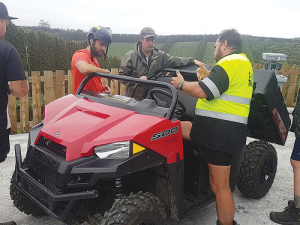Wired for Science: Understanding the feeding habits of mealybug
Fussy children might be frustrating, but fussy mealybugs could help protect the New Zealand wine industry from grapevine leafroll-associated virus 3.
 Midwinter drilling of oats, triticale, and Italian ryegrass in trial test plots at Craigmore Farming’s Te Awa farms in Te Pirita, Canterbury.
Midwinter drilling of oats, triticale, and Italian ryegrass in trial test plots at Craigmore Farming’s Te Awa farms in Te Pirita, Canterbury.
Lincoln University-owned research and development company Lincoln Agritech says dairy farmers might improve their environmental footprints and profit through two research projects now underway.
Lincoln Agritech got hefty grants in the latest round of the Ministry of Primary Industry’s Sustainable Farming Fund for two three-year studies that began on July 1.
One is looking into using winter catch crops to reduce nitrate leaching loss, and the other into using real-time optical sensors to direct variable-rate fertiliser application in dairy pastures.
Dr Peter Carey, who heads the catch crop study, said research already showed farmers could use nitrogen more efficiently while reducing their environmental footprint, by following grazed winter forage crops with a crop that can be lifted for green chop silage in November. The study aims to show how it could be up-scaled from research trials to commercial working farms, and done reliably and consistently, using various crops under various conditions.
“It can be a win-win situation. But traditionally, trying to sow a crop in the middle of winter is not usually encouraged. Often those paddocks have lain fallow until the next sowing of a winter forage crop or pasture in spring.”
Carey says that rain and leaching from grazed winter feed paddocks can cause a major loss of nitrate.
“It may be only 10% of their farm area, but it may be 40% of their nitrogen loss over that year.”
He says some farmers are experimenting with winter crops but with variable results. They want confidence that it would work, and the study is aimed at producing workable guidelines.
Carey says contractors involved in the study are also enthusiastic, as winter sowing could bring them work at an otherwise quiet time of year.
The study will be trying out new technology -- a power spade plough imported from the Netherlands and designed to manage even wet soils. The spading action helps drive the tractor forward as it works, rather than it relying on tyre traction in muddy ground.
Voting has started for the renewal of DairyNZ's milksolids levy.
The most successful catchment groups in NZ are those that have 'a source to sea' approach.
Associate Agriculture Minister and Manawatu dairy farmer Andrew Hoggard says the free trade agreement (FTA) negotiated with India is not a bad deal and his party, Act, will support it when it goes before Parliament.
Newly released data from Environment Canterbury (ECan) Farm Environment Plan (FEP) audits are showing a dramatic lift in environmental performance across the region.
A solid recovery of global dairy prices this year makes a $9.50/kgMS milk price almost a shoo-in for this season.
As New Zealand marks the United Nations’ International Year of the Woman Farmer 2026 (IYWF 2026), industry leaders are challenging the misconception that women only support farming.